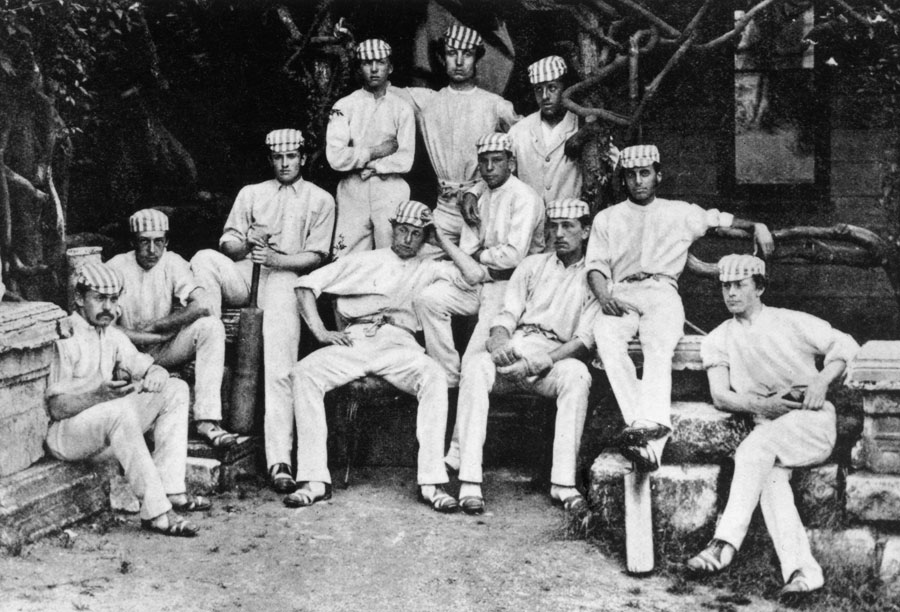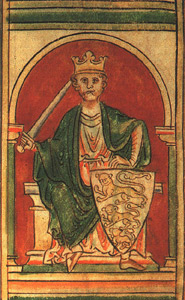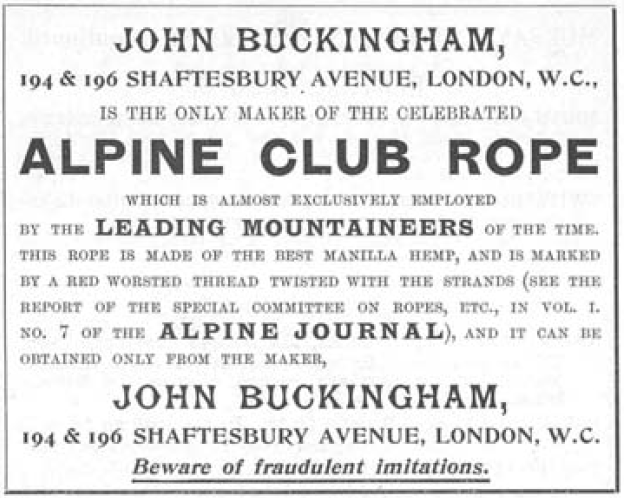|
Charles Gilbert Heathcote
Charles Gilbert Heathcote (2 March 1841 – 15 November 1913) was an English barrister and tennis player. He was one of the founders of the All England Club, and played in the first Wimbledon Championships in 1877 Biography Heathcote was born at Conington Castle, Conington, Huntingdonshire, the third son of John Heathcote of Conington Castle Huntingdon and his third wife Emily Colbourne. He was educated at Eton College and was admitted at Trinity College, Cambridge, on 6 April 1859. He was a scholar and migrated to Emmanuel College, Cambridge on 20 June 1863, being awarded an MA in 1866. He was admitted at Inner Temple on 26 January 1865 and was called to the bar on 18 November 1867. He served on the South Eastern Circuit. Heathcote was one of the founders of the All England Lawn Tennis and Croquet Club. He is cited as one of the committee that formulated the rules of tennis in 1877 before the first Wimbledon Championships although according to other sources the Heathcote co ... [...More Info...] [...Related Items...] OR: [Wikipedia] [Google] [Baidu] |
Conington, Huntingdonshire
Conington (Conington All Saints, or "Conington-juxta-Petriburg") is an English village and civil parish in the Cambridgeshire district of Huntingdonshire. Conington lies about 10 km (6 miles) south of Peterborough and 3 km (2 miles) north of Sawtry. It is within earshot of the A1(M), part of the Great North Road, which follows the course of the Roman Ermine Street. Conington lies within Huntingdonshire, which is a non-metropolitan district of Cambridgeshire and one of the historic counties of England. History Conington was listed in the Domesday Book in the Hundred of Normancross in Huntingdonshire; the name of the settlement was written ''Coninctune'' in the Domesday Book of 1086, when there was just one manor at Conington; the annual rent paid to the lord of the manor in 1066 had been £9 and the rent was the same in 1086. The Domesday Book also records that there were 27 households at Conington. Estimates for the average size of a household at that time range from 3.5 to ... [...More Info...] [...Related Items...] OR: [Wikipedia] [Google] [Baidu] |
Spencer Gore (sportsman)
Spencer William Gore (10 March 1850 – 19 April 1906) was an English tennis player who won the first Wimbledon tournament in 1877 and a first-class cricketer who played for Surrey County Cricket Club (1874–1875). Early years Spencer William Gore was the son of the Hon. Charles Alexander Gore, grandson of the second Earl of Arran, and Lady Augusta Lavinia Priscilla (''née'' Ponsonby), a daughter of the fourth Earl of Bessborough. His mother's first marriage was to William Petty-FitzMaurice, Earl of Kerry, who died in 1836. His father was the Commissioner of Woods and Forests. His two brothers were the theologian Charles Gore, the first Bishop of Birmingham, and Sir Francis Charles Gore, Solicitor to the Board of Inland Revenue. Spencer was born and raised within a mile of the All England Croquet Club at West Side House, Wimbledon Common, Surrey. He was educated at Harrow School, where he excelled at all games, especially football and cricket, and was the captain of the ... [...More Info...] [...Related Items...] OR: [Wikipedia] [Google] [Baidu] |
People Educated At Eton College
A person ( : people) is a being that has certain capacities or attributes such as reason, morality, consciousness or self-consciousness, and being a part of a culturally established form of social relations such as kinship, ownership of property, or legal responsibility. The defining features of personhood and, consequently, what makes a person count as a person, differ widely among cultures and contexts. In addition to the question of personhood, of what makes a being count as a person to begin with, there are further questions about personal identity and self: both about what makes any particular person that particular person instead of another, and about what makes a person at one time the same person as they were or will be at another time despite any intervening changes. The plural form "people" is often used to refer to an entire nation or ethnic group (as in "a people"), and this was the original meaning of the word; it subsequently acquired its use as a plural form of per ... [...More Info...] [...Related Items...] OR: [Wikipedia] [Google] [Baidu] |
Heathcote Family
Heathcote may refer to: Places in Australia *Heathcote, New South Wales, a suburb of Sydney ** Electoral district of Heathcote, a seat in the New South Wales Legislative Assembly **Heathcote National Park ** Parish of Heathcote a parish of Cumberland County *Heathcote, Victoria **Heathcote-Graytown National Park ** Heathcote wine region * Heathcote Junction, Victoria * Heathcote South, Victoria * Point Heathcote, Western Australia in Canada * Heathcote Lake, Ontario in England * Heathcote, Ilkley, a villa in West Yorkshire * Heathcote, Derbyshire * Heathcote, Shropshire * Heathcote, Warwickshire, a suburb of Leamington Spa in New Zealand * Heathcote Valley, a suburb of Christchurch ** Heathcote River ** Heathcote (New Zealand electorate) in the United States * Heathcote Community, Maryland * Heathcote, New Jersey ** Heathcote Brook ** Withington Estate, also known as Heathcote Farm People as a forename * Heathcote Helmore (1894–1965), New Zealand architect *Heathcote ... [...More Info...] [...Related Items...] OR: [Wikipedia] [Google] [Baidu] |
1913 Deaths
Events January * January 5 – First Balkan War: Battle of Lemnos – Greek admiral Pavlos Kountouriotis forces the Turkish fleet to retreat to its base within the Dardanelles, from which it will not venture for the rest of the war. * January 13 – Edward Carson founds the (first) Ulster Volunteer Force, by unifying several existing loyalist militias to resist home rule for Ireland. * January 23 – 1913 Ottoman coup d'état: Ismail Enver comes to power. * January – Stalin (whose first article using this name is published this month) travels to Vienna to carry out research. Until he leaves on February 16 the city is home simultaneously to him, Hitler, Trotsky and Tito alongside Berg, Freud and Jung and Ludwig and Paul Wittgenstein. February * February 1 – New York City's Grand Central Terminal, having been rebuilt, reopens as the world's largest railroad station. * February 3 – The 16th Amendment to the United States Cons ... [...More Info...] [...Related Items...] OR: [Wikipedia] [Google] [Baidu] |
1841 Births
Events January–March * January 20 – Charles Elliot of the United Kingdom, and Qishan of the Qing dynasty, agree to the Convention of Chuenpi. * January 26 – Britain occupies Hong Kong. Later in the year, the first census of the island records a population of about 7,500. * January 27 – The active volcano Mount Erebus in Antarctica is discovered, and named by James Clark Ross. * January 28 – Ross discovers the "Victoria Barrier", later known as the Ross Ice Shelf. On the same voyage, he discovers the Ross Sea, Victoria Land and Mount Terror. * January 30 – A fire ruins and destroys two-thirds of the villa (modern-day city) of Mayagüez, Puerto Rico. * February 4 – First known reference to Groundhog Day in North America, in the diary of a James Morris. * February 10 – The Act of Union (''British North America Act'', 1840) is proclaimed in Canada. * February 11 – The two colonies of the Canadas are merged, into the United Province of Canada. * February ... [...More Info...] [...Related Items...] OR: [Wikipedia] [Google] [Baidu] |
Justice Of The Peace
A justice of the peace (JP) is a judicial officer of a lower or ''puisne'' court, elected or appointed by means of a commission ( letters patent) to keep the peace. In past centuries the term commissioner of the peace was often used with the same meaning. Depending on the jurisdiction, such justices dispense summary justice or merely deal with local administrative applications in common law jurisdictions. Justices of the peace are appointed or elected from the citizens of the jurisdiction in which they serve, and are (or were) usually not required to have any formal legal education in order to qualify for the office. Some jurisdictions have varying forms of training for JPs. History In 1195, Richard I ("the Lionheart") of England and his Minister Hubert Walter commissioned certain knights to preserve the peace in unruly areas. They were responsible to the King in ensuring that the law was upheld and preserving the " King's peace". Therefore, they were known as "keepers of th ... [...More Info...] [...Related Items...] OR: [Wikipedia] [Google] [Baidu] |
New Alresford
New Alresford or simply Alresford ( or ) is a market town and civil parish in the City of Winchester district of Hampshire, England. It is northeast of Winchester and southwest of the town of Alton. New Alresford has independent shops, a tourist information centre, a central conservation area, four tea rooms, five pubs and is the western terminus of the Watercress Line, a steam-worked heritage railway at Alresford railway station. History There is evidence of Neolithic, Bronze Age and Iron Age occupation on numerous sites in the Alresford area, with a Roman or Romano-British site on nearby Fobdown and to the south-east of the town in Bramdean. There is evidence of a grant to the Church at Winchester sometime before the 9th century, which became known as the Liberty of Alresford. Alresford was listed in the Domesday Book but this probably refers to what is now Old Alresford as there is no evidence of a settlement south of the river at this time. Old Alresford as with Farnh ... [...More Info...] [...Related Items...] OR: [Wikipedia] [Google] [Baidu] |
Brighton
Brighton () is a seaside resort and one of the two main areas of the City of Brighton and Hove in the county of East Sussex, England. It is located south of London. Archaeological evidence of settlement in the area dates back to the Bronze Age, Roman and Anglo-Saxon periods. The ancient settlement of "Brighthelmstone" was documented in the ''Domesday Book'' (1086). The town's importance grew in the Middle Ages as the Old Town developed, but it languished in the early modern period, affected by foreign attacks, storms, a suffering economy and a declining population. Brighton began to attract more visitors following improved road transport to London and becoming a boarding point for boats travelling to France. The town also developed in popularity as a health resort for sea bathing as a purported cure for illnesses. In the Georgian era, Brighton developed as a highly fashionable seaside resort, encouraged by the patronage of the Prince Regent, later King George IV, who spent ... [...More Info...] [...Related Items...] OR: [Wikipedia] [Google] [Baidu] |
Magistrates Of England And Wales
Magistrates are trained volunteers, selected from the local community, who deal with a wide range of criminal and civil proceedings. They are also known as Justices of the Peace. In the adult criminal court, magistrates decide on offences which carry up to twelve months in prison, or an unlimited fine. Magistrates also sit in the family court where they help resolve disputes that involve children, and in the youth court which deals with criminal matters involving young people aged 10-17. Established over 650 years ago, the magistracy is a key part of the judiciary of England and Wales, and it is a role underpinned by the principles of 'local justice' and 'justice by one's peers'. Magistrates typically sit as a bench of three, mixed in gender, age and ethnicity where possible, to bring a broad experience of life to the bench. They can sit alone to hear warrant applications or deal with uncontested matters heard under the single justice procedure. All members of the bench have e ... [...More Info...] [...Related Items...] OR: [Wikipedia] [Google] [Baidu] |
Alpine Club (UK)
The Alpine Club was founded in London in 1857 and is the world's first mountaineering club. The primary focus of the club is to support mountaineers who climb in the Alps and the Greater Ranges of the world's mountains. History The Alpine Club was founded on 22 December 1857 by a group of British mountaineers at Ashley's Hotel in London. The original founders were active mountaineers in the Alps and instrumental in the development of alpine mountaineering during the Golden Age of Alpinism (1854–1865). E. S. Kennedy was the first chairman of the Alpine Club but the naturalist, John Ball, was the first president. Kennedy, also the first vice-president, succeeded him as president of the club from 1860 to 1863. In 1863, the club moved its headquarters to the Metropole Hotel. The Alpine Club is specifically known for having developed early mountaineering-specific gear including a new type of rope. The goal was to engineer a strong and light rope that could be carried easily ... [...More Info...] [...Related Items...] OR: [Wikipedia] [Google] [Baidu] |
1880 Wimbledon Championship – Singles
Herbert Lawford defeated Otway Woodhouse, 6–5, 6–4, 6–0 in the All Comers' Final, but the reigning champion John Hartley defeated Lawford, 6–3, 6–2, 2–6, 6–3 in the challenge round to win the gentlemen's singles tennis title at the 1880 Wimbledon Championships.100 Years of Wimbledon by Lance Tingay, Guinness Superlatives Ltd. 1977 Draw Challenge round All comers' finals Top half Section 1 Section 2 Bottom half Section 3 Section 4 References External links * {{DEFAULTSORT:1880 Wimbledon Championship - Singles Singles Singles are people not in a committed relationship. Singles may also refer to: Film and television * ''Singles'' (miniseries), a 1984 Australian television series * ''Singles'' (1992 film), written and directed by Cameron Crowe * ''Singles'' ... Wimbledon Championship by year – Men's singles ... [...More Info...] [...Related Items...] OR: [Wikipedia] [Google] [Baidu] |

_1938.jpg)






